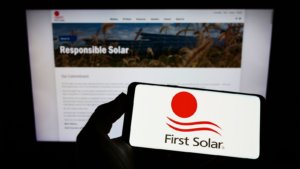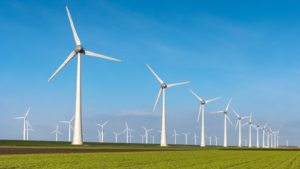
The renewable energy industry will grow to $2 trillion by 2030, according to estimates from Group Next Move Strategy Consulting, making renewable energy stocks a must-invest for accounts that want to be safe in the future.
A few pieces of legislation that will help the economy switch to cleaner energy sources are the Inflation Reduction Act (IRA) of 2022, the Bipartisan Infrastructure Law, and the Executive Order on Catalyzing Clean Energy Industries and Jobs Through Federal Sustainability. After the election season, expect more of these kinds of bills.
In addition, the amount of green energy available is growing very quickly. Some 95% of the expected rise comes from solar PV and wind power. This rise is important because, by early 2025, renewables will be the main source of energy around the world.
In this light, let’s look at three renewable energy stocks whose earnings are better than expected and who are projecting healthy growth through 2024. The first pick has increased its project pipeline to 21.5 gigawatts. The second says that net sales will be between $4.4 billion and $4.6 billion in 2024. The last one changed from a real estate investment trust (REIT) to a C-corporation to get better tax breaks for fuel.
Let’s explore further!
NextEra Energy (NEE)

Taking into account the 1,165 megawatts (MW) of new projects that have been put into service since the fourth quarter of 2023, NextEra Energy‘s (NYSE:NEE) pipeline is now close to 21.5 gigawatts (GW).
In Q1 2024, NextEra Energy added 2,765 megawatts of new projects, making it the second-best quarter for renewables growth. NextEra thinks that the renewables and storage industry will triple in seven years thanks to federal and state funding. Rising energy demand in the U.S. and its capacity will also allow it to exploit this growth.
Moreover, Florida Power & Light, a NextEra company, plans to double the amount of energy it can store in batteries and raise the amount of solar power it produces from 6% in 2023 to 38% by 2033.
You can earn income and cash from this stock. Despite beating Wall Street estimates, the stock price is still far from its 52-week high of about $78.
In addition, NextEra stands out for buyers looking for high yields because its dividends have been raised every year for 30 years. At about 3%, its payout return is in the upper half of that of its competitors. Its payouts have grown by 19% a year over the last three years, which puts it in the top 20% of companies.
First Solar (FSLR)

Due to seasonal module sales declines, First Solar‘s (NASDAQ:FSLR) first-quarter 2024 net sales fell from $1.158 billion to $794 million. Earnings per share (EPS) fell from $3.25 in Q4 2023 to $2.20 in Q1 2024, lowering profit margin.
Despite these data, the markets responded favorably to the earnings announcement since the solar company beat Wall Street EPS and revenue projections by 8% and 10%, respectively.
Based on $400 million in Section 45X tax credits in the first half of 2024 and $620 million in the second, First Solar expects net sales of $4.4 billion to $4.6 billion and earnings per common share of $13 to $14.
So far this year, the business has sold 2.7 gigawatts for 31.3 cents per watt. An expected 78.3 gigawatt sales backlog bodes well for future profitability.
Success in 2023 included buying Evolar, a European thin-film company, to advance tandem solar technology development using perovskite thin films. First Solar is also establishing an innovation center in Perrysburg, Ohio, to encourage research and development. A $370 million program will speed thin-film PV module development and manufacture.
The business aims to improve solar technology, especially with its domestically produced Series 7 modules, which should raise performance and competitiveness. With its performance thus far in 2024, it’s fair to assume success.
Hannon Armstrong Sustainable Infrastructure (HASI)

Hannon Armstrong Sustainable Infrastructure (NYSE:HASI) reported a good fiscal quarter to round off 2023. The need of the hour after its board decided to end its position as a REIT and become a taxable C-corporation to keep operations running smoothly with minimum change to the status quo.
This kind of change is not always smooth since HASI was known for its tax attributes. However, HASI stockholder fears were answered thanks to EPS of 62 cents, which was 17% above the predicted 53 cents, while sales of around $47 million exceeded Wall Street estimates of $37 million by roughly 25%.
HASI expects its 2023 purchases to prevent 760,000 metric tons of carbon pollution, which will help it attract environmental, social and governance (ESG)-focused investors. HASI owns 1.3 GW of AES (NYSE:AES) and invests heavily in green energy. Complimenting this, HASI assets and portfolio stand at $12.3 billion and $6.2 billion, both up double digits from last year.
From 2024 to 2026, HASI expects distributable earnings per share to increase by 8% to 10%. In addition, through 2026, HASI plans to pay dividends equal to 60% to 70% of its distributable profits per share.
The mix of strong quarterly performance amid a tricky transition and excellent payouts makes HASI one of the best renewable energy stocks out there.
On the date of publication, Faizan Farooque did not have (either directly or indirectly) any positions in the securities mentioned in this article. The opinions expressed in this article are those of the writer, subject to the InvestorPlace.com Publishing Guidelines.




